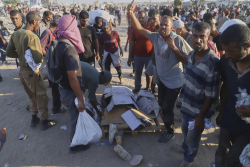Lee Jae-myung’s cabinet appointments reflect a desire for renewed dialogue with North Korea, but with Pyongyang emboldened by Russia and disinterested in reunification, diplomacy faces steep geopolitical headwinds.
Editor’s Note: This article is part of the symposium “President Lee and North Korea.” The full symposium can be found here.
As Lee Jae Myung assembles his cabinet, the prospects for a return to past “sunshine policies” grow stronger. Yet, the international landscape has changed significantly in the past five years, casting some doubt on the new administration’s plans for improved dialogue. There is no question that President Lee will seek better relations with North Korean leader Kim Jong-un, but many questions remain about how North Korean and US actions could impact this process.
Will President Lee’s Inter-Korean Policies Hurt South Korea’s Relationship with the United States?
The recent nominations of Ahn Gyu-back for Defense Minister, Cho Hyun for the Minister of Foreign Affairs, and Chung Dong-young for Minister of Unification signal a strong commitment to reinvigorating dialogue with North Korea. In a press briefing this week, Presidential Chief of Staff Kang Hoon-sik declared that “Chung has unmatched experience and a firm commitment to peace on the Korean Peninsula. He’s the right person to help create conditions for dialogue with North Korea and to find a breakthrough in easing tensions on the Korean Peninsula.”
Will the conversation be one-sided?
Kim Jong-un famously gave up on reunification in early 2024, when he declared reunification was no longer possible and that South Korea was the primary foe and invariable principal enemy. This followed the collapse in late 2023 of the 2018 Comprehensive Military Agreement, arguably the most critical agreement related to reducing tensions on the peninsula and a key legacy of Moon Jae-In.
Since then, North Korea has resumed missile testing, enhanced uranium enrichment and plutonium production capabilities, and has supported Russia’s war against Ukraine. Russia certainly will be in no rush to encourage North Korea towards a reconciliation, and may be actively helping North Korea’s weapons of mass destruction programs.
Will America’s North Korea Policy Change Because of President Lee?
President Trump’s approach to North Korea will remain a wild card for the near future. With its North Korea policy in review and new turbulence in the Middle East, it may be a while before the Trump White House turns its attention to the Korean peninsula.
However, the review indicates that Trump is unlikely to back down from his demands for allies to increase their defense spending, a stance that South Korea, under President Yoon, has already adopted. In light of Yoon’s impeachment, President Lee must show his authority and competence over the South Korean military, as his nomination of a civilian, liberal lawmaker Ahn Gyu-Back, to lead South Korea’s Ministry of Defense attempts to do.
Strengthening civilian control over the military does not have to interrupt South Korea’s military modernization plans. Still, it undoubtedly will affect how vigorously military options for deterring North Korea are pursued versus diplomatic options.
North Korea is stronger and Kim Jong-un is more confident today than ever in the past ten years. This will undoubtedly complicate President Lee’s efforts to reduce tensions. Given that there is nowhere to go but up, President Lee can start slowly with a focus on crisis avoidance. Reviving measures in the Comprehensive Military Agreement with a clear focus on preventing conventional conflict will be crucial.
For more far-reaching risk reduction, President Lee will need to involve the United States, China, and potentially Russia to cap or reduce North Korea’s risks to the region, balancing bilateral objectives with broader multilateral ones.
About the Author: Sharon Squassoni
Sharon Squassoni is a research professor at the Elliott School of International Affairs at George Washington University, where she focuses on nuclear weapons proliferation and arms control. While in the US government, she held senior positions at the State Department, the Arms Control and Disarmament Agency, and the Congressional Research Service.
Image Credit: Wikimedia Commons/Office of the President of Russia.















